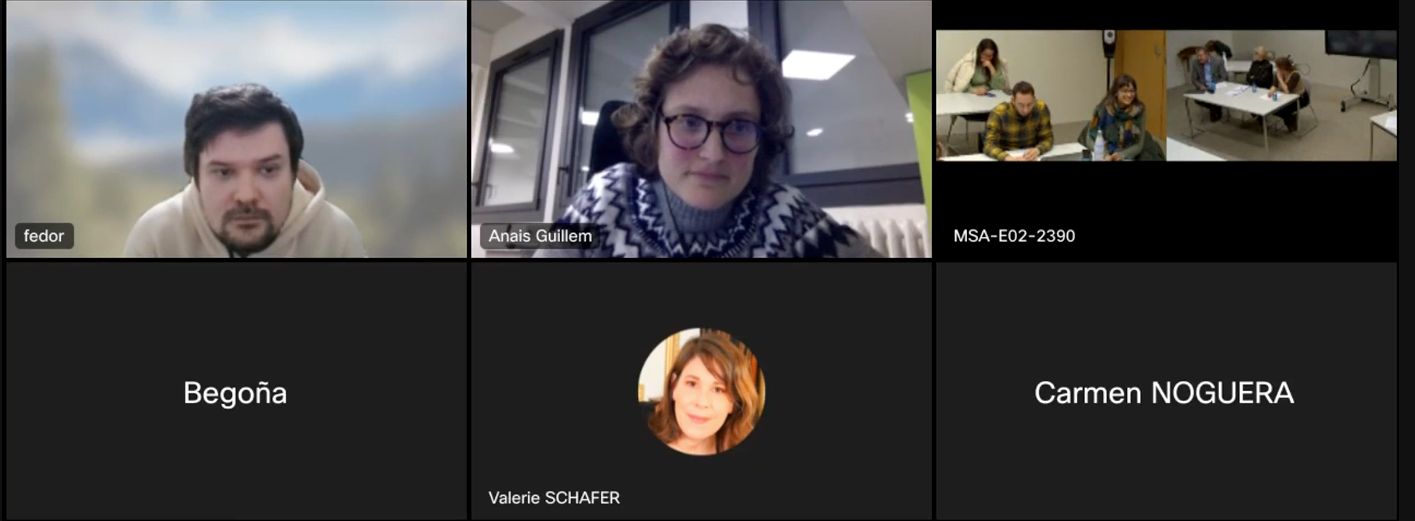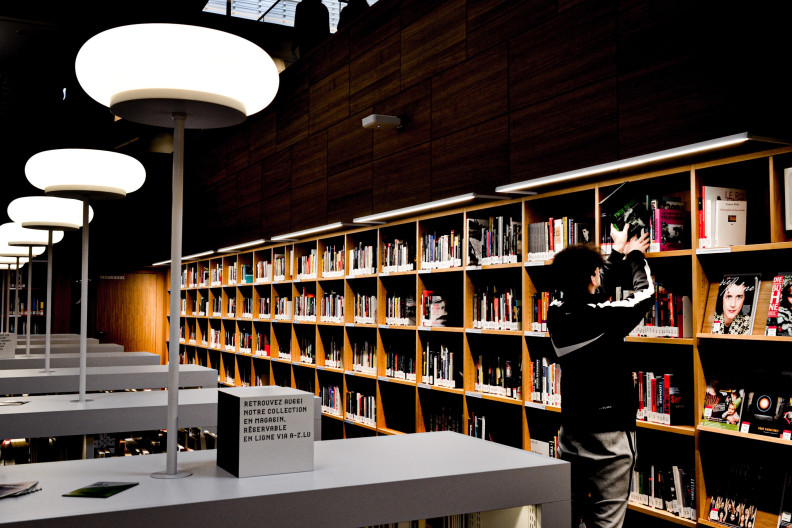In recent years, digital heritage has become more topical than ever: the fire in Notre Dame Cathedral in 2019, the destruction caused by earthquakes during the Tsunami in 2004, and, unfortunately, the recent topical issues, war, and violent conflicts such as the Russian invasion of Ukraine.
Digital cultural heritage became, is, and remains crucial for us researchers, institutions, society, and governments. At the Luxembourg Centre for Contemporary and Digital History (C²DH), we organised four roundtables from November 2022 to February 2023, bringing together various experts to discuss following aspects:
- Preserving cultural heritage in times of crisis - current initiatives such as SUCHO in web archiving and digitisation.
- The use of digital cultural heritage for research
- Digital visualisation of cultural heritage
- Digitalisation in research and cultural heritage institutions and preparation for times of crisis
According to Unesco, “Digital heritage consists of unique resources of human knowledge and expression. It embraces cultural, educational, scientific and administrative resources and technical, legal, medical and other information created digitally or converted into digital form from existing analogue resources. Where resources are “born digital”, there is no other format but the digital object. Digital materials include texts, databases, still and moving images, audio, graphics, software and web pages, among a wide and growing range of formats. They are frequently volatile and require purposeful production, maintenance, and management to be retained.”
1. Preserving digital cultural heritage in times of crisis- the successful case of SUCHO
On 23 November 2022, the Centre for Contemporary and Digital History at the University of Luxembourg hosted the workshop “Witnessing the Now: Challenges for Emergency Archiving and Oral History following the Russian Invasion of Ukraine". The three-day workshop brought together researchers conducting various forms of emergency archiving and collaborative reflection on the challenges and limitations of this work for documenting the ongoing Russian war in Ukraine. The workshop was held in cooperation with the Center for Urban History, Lviv, the University of St Andrews, the Institute of Philosophy and Sociology of the Polish Academy of Science, and the C²DH at the University of Luxembourg.
The opening roundtable discussion was titled “(Digital) Cultural Heritage at Risk: Lessons Learned for Future Preservation Strategies.” The speakers included Valérie Schafer (C²DH), Yves Maurer (National Library of Luxembourg), Taras Nazaruk (Center for Urban History of East Central Europe, Lviv), Erica Peaslee (volunteer at SUCHO), and Kateryna Zakharchuk (Project War Testimonies, C²DH).
The Russian invasion of Ukraine on 24 February 2022 exposed the fragility of servers, data, and infrastructure to physical threats and their exposure to online attacks. Consequently, individual and community efforts emerged to support and safeguard Ukrainian digital cultural heritage. The roundtable aimed to reflect on the challenges imposed on these efforts from multiple perspectives: technical points of view, such as providing backups and fallback infrastructures; data protection regulations; and volunteer coordination strategies. The discussion revolved around making digital cultural heritage more resilient and the lessons learned from these efforts.
During the roundtable discussion, participants answered questions about digital preservation, how the initiative to archive war-related information on Telegram emerged and was coordinated, what data is preserved and how it is contextualised, the preservation strategies for Luxembourg, the organisation of web archiving in Europe, and the main challenges faced in the project. They also discussed plans for research activities, accessibility of the data, and preservation strategies. The workshop aimed to encourage collaborative reflection on the challenges and limitations of emergency archiving and the preservation of cultural heritage during times of crisis, as well as to develop strategies for future preservation efforts.
2. Digital cultural heritage for research- the challenges of access and keeping up with new tools
On 15 December 2022, a roundtable discussion was held online to explore the topic of digital cultural heritage (DCH) for research. The panel was composed of Guilia Osti (University College Dublin), Lorella Viola (C²DH), and Steven Claeyssens (National Library of the Netherlands). Valérie Schafer (C²DH) moderated the discussion.
The panellists addressed several guiding questions to shed light on the various elements that constitute digital cultural heritage, share their definitions and experiences, explore the role of institutions, discuss access to collections and platforms, and analyse support for researchers. The needs and practices of researchers were also highlighted, along with the required skills and knowledge, such as understanding metadata, approaching born-digital material, integrating it into the research process, and more.
The limits and possibilities of digital cultural heritage were discussed, focusing on the differences between digitalisation and the original form of cultural heritage. The panellists explored how these differences affect the output and analysis of data. Furthermore, the born-digital aspect of cultural heritage was examined, and the differences in its analysis were explored.
The panellists then offered an outlook on digital cultural heritage’s current and future challenges, providing lessons learned for future perspectives. They discussed the importance of technological advancements, including adopting artificial intelligence (AI) and developing new tools and platforms for cultural heritage management.
In conclusion, the roundtable discussion on digital cultural heritage for research provided valuable insights into the field’s various aspects. The panellists’ experience and expertise in the field made it an informative session that addressed various topics related to digital cultural heritage, including its role in research, access, support, and its limits and possibilities. The insights gained from this discussion will benefit researchers, institutions, and policymakers working to preserve and manage cultural heritage in the digital age.
3. Digital visualisation of cultural heritage. Reconstruction or visualisation?
A roundtable discussion on 3D Visualisation and Scanning in the field of digital cultural heritage was held on 17 January 2023. This discussion was prompted by the ongoing conflict in Ukraine, highlighting the need to preserve both material and digital cultural heritage.
The roundtable discussion was attended by Muriel van Ruymbeke (C²DH), Martin Uhrmacher (Historical Institute, University of Luxembourg) and Anais Guillem (Laboratoire de Recherche des Monuments Historiques, CNRS-MAP). In addition to the above guests, Iana Boitsova and Fedir Boitsov (Pixelated Realities, Ukraine) were at the roundtable discussion. The moderator of the roundtable discussion was Marleen de Kramer (previously C²DH).
The participants shared their experiences and perspectives on 3D visualisations and reconstructions during the discussion. They discussed the definition of their field and whether they used the terms “visualisation” and “reconstruction” interchangeably. They also discussed specific examples of projects, their significance in the field of digital culture, and the challenges they faced when creating or working with 3D visualisations. The participants also shared the achievements and advancements in the field of 3D visualisations, both technological and methodological.
Furthermore, the discussion focused on using 3D visualisations as a tool for preserving and interpreting digital cultural data, particularly in archaeology, architecture, and history. The participants also discussed how the scientific method could be applied in their field and the tools they relied on. They also talked about the role of 3D visualisations in times of crisis and their potential for the preservation and documentation of cultural heritage sites. Additionally, they discussed potential reuse scenarios for 3D visualisation data in the context of post-war recovery and rebuilding of cultural heritage.
The discussion concluded with the participants sharing their favourite tools and recommendations for other scholars and digital cultural practitioners looking to utilise 3D visualisations in their work. Overall, the roundtable discussion was a valuable platform for exchanging ideas and sharing knowledge about 3D visualisations and their significance in digital cultural heritage preservation.
It is essential to consider the use for research and accessibility, as 3D models can often be too heavy for specific platforms to implement. Furthermore, researchers especially need to address the question of authenticity, such as whether the 3D/2D images only represent the object/building or if they are a Digital Twin. This should be considered during research and discussed thoroughly in terms of accessibility.
The special guest and project responsible for Pixelated Realities presented their ongoing Victory Museum project. They planned to use an innovative documentary and cultural heritage to inform the people of Ukraine and the EU about the immediate effects of war on Ukrainian cities to unite people to act for peace and conquer disinformation and propaganda.
4. Digitalisation Strategies in Luxembourg and Europe - The need for a joint vision of digitalisation
The last roundtable on 16 February 2023, focused on digitalisation strategies in Luxembourg and Europe. The event featured a panel of distinguished guests, including Alessandra Luciano (Service de la stratégie numérique du ministère de la Culture in Luxembourg), Frederik Truyen (University of Leuven), Yves Maurer (National Library of Luxembourg), Rob Davies (Heritage Management Organisation), André Marques (Freelancer at National Museum of Resistance in Luxembourg), and Michele Peporté, and Joel Thill (National Archives of Luxembourg). The panel was moderated by Nina Janz (Project WARLUX, C²DH).
The discussion focused on the challenges of digitalisation and establishing an infrastructure for digital cultural heritage. The panel explored how digitalisation transforms the sector, creating new research opportunities, jobs, users, and uses. They considered the definition of digitalisation and how it affects cultural heritage beyond just scanning and storing data. The panel also discussed the importance of transparency, availability, and the potential misuse of data and photos.
The participants also highlighted the challenges of preserving born-digital cultural heritage and establishing standards and metadata for effective post-processing. In addition, the discussion touched on the need for a joint national and European vision for digitalisation, with smaller institutions such as museums included in national digitalisation plans and provided with training opportunities.
Overall, the event showed that digitalisation offers new possibilities for GLAM (Galleries, Libraries, Archives, and Museums) representatives and society, but it also poses significant challenges. The discussion highlighted the importance of a coordinated national and European approach and the need for a sustained effort to fully digitise cultural heritage collections. The panel also recognised the crucial role of researchers in the digitalisation process.
Finally, the roundtable explored the politics of digital cultural heritage, emphasising the broader theme of accessibility and the crucial role of data in creating a more open and transparent cultural heritage sector.
In short…and next steps
As demonstrated by the different roundtables, we take the following key points as the next steps for future actions on the topic:
Universities should promote digital heritage in research and teaching while teaching source criticism and including born-digital data.
Collaboration between universities and cultural heritage institutions is crucial and should be supported.
Promoting transparency, clear guidelines should be established to determine what will be digitised and how, with open dialogue with cultural, governmental, educational, research sectors, and civil society.
Hosting the event series and witnessing the engaging conversations and insightful knowledge-sharing among the organisers and guests was a pleasure. Digital cultural heritage covers a wide range of topics and offers promising avenues for future discussions, particularly concerning sustainability and the use of AI. We would like to express our heartfelt appreciation to all the guests and panellists for their invaluable contributions to the event’s success.






